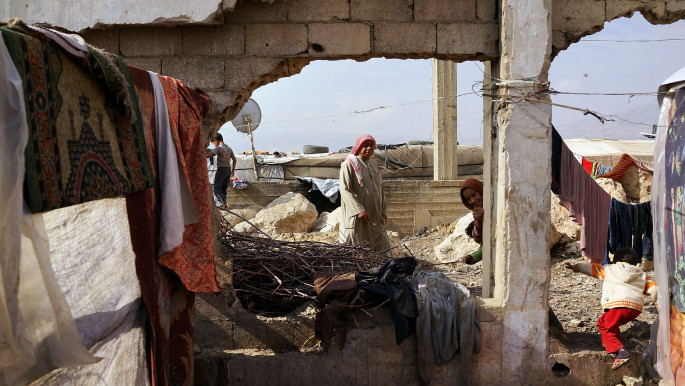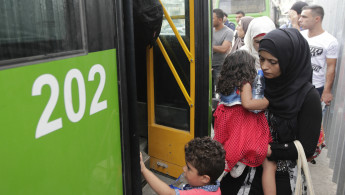The risk of return: Why going home is not an option for all Syrians
Syrians are forced to stay in almost unliveable conditions, either due to being in poorly equipped refugee camps, or endure xenophobia and alienation whilst trying to settle in a new land.
Eight years of war has created over 11 million displaced Syrians, with around five million forced to flee the country. The depth of the crisis is clear.
The regime of Bashar al-Assad, who has ruled since 2000 after his father Hafez al-Assad, in power since 1970, has not got little real authority over the country.
Despite attempts to portray the country as stable, from the Syrian government and its backers, NGOs like Human Rights Watch, the Syrian Network for Human Rights, and even the UNHCR warn that the situation is currently far from stable.
"There is currently no central government. The country is still divided between rebels and militants, the Assad government, Iran and Hezbollah mainly," Mohammed Jamil, Director at the Arab Organisation for Human Rights, told The New Arab.
 |
|
| Read also: Syria Weekly: Deportation, detention and death haunts Syrian refugees in Lebanon |
The US-backed Syrian Democratic Forces have also detained thousands, according to the Syrian Network for Human Rights, showing a widely unsafe environment.
"The countries who pressure Syrian refugees to return hold responsibility for their potential danger. The Assad regime is still a threat to many Syrians on many levels. First of all by arrests, with 90 percent of those arrested being disappeared. There is also the risk of torture in detention centres. Even those who are not prosecuted by the regime risk being forcibly drafted into the military," Fadel Abdul Ghany, Chairman of the Syrian Network for Human Rights, told The New Arab.
Fadel said despite propaganda now portraying Syria as a safe haven for people to return, it is still highly dangerous for these reasons. Russia particularly wants to portray the country as stable for its own PR purposes, and that this is a propaganda tool from the regime too.
A report by the Syrian Network for Human Rights, which had monitored Syrian refugees attempting to return since 2014, noted that the regime had arbitrarily detained returning refugees.
 |
Despite propaganda now portraying Syria as a safe haven for people to return, it is still highly dangerous for these reasons |  |
Among some of the returnees it had monitored, the SNHR found that at least 1,916 were arrested, including 219 children and 157 women. Of these detainees, 1,132 were released, while 784 remained in detention, 638 of whom were forcibly disappeared.
Any refugee with some kind of opposition to the regime risks disappearing upon return to Syria.
Loay Thalja, a veterinarian and former activist for the Syrian communist party, who was born in 1955, was abducted on the Syrian-Lebanese border. SNHR reported that he was tortured to death in a Syrian detention centre.
Dissident soldiers, who had defected from the army and left the country, are at higher risk of being enforced in prison. SNHR had recorded some cases of them being arrested.
Highlighting that refugees are easy targets for conscription, the report stated: "The Syrian regime has been trying in every way to fill the human shortage in its military forces. It changed its previous age criteria for military service, conscripting those born after 1982, prosecuting anyone attempting to avoid forced conscription."
Widespread military conscription is a key risk for Syrians. Mohammad Jamil of AOHR said that returnees face the choice of being forced to do the state’s bidding, either acting as a guard or taking part in a military campaign. If they refuse, they will be punished.
Militarisation is a big focus for the regime. Fadel Abdul Ghany said, "The fact that the regime has not focused its resources on providing more services shows that it does not care about the people’s wellbeing as a priority."
Despite all these obvious dangers for returnees, many refugees are encountering significant threats and dangers wherever they have sought refuge.
 |
There is a toxic campaign from politicians and media outlets to portray Syrian refugees as a huge burden |  |
Lebanon, neighbouring Syria, hosts around 1.5 million Syrians, yet the government has tried to make life difficult for the refugees.
Human Rights Watch reported in September that between May and August 2019, over 2,731 refugees in Lebanon were deported and handed to the Syrian authorities. There is direct collaboration between Syrian and Lebanese authorities over the management of refugees.
"There is a toxic campaign from politicians and media outlets to portray Syrian refugees as a huge burden. Even though much of the rhetoric against refugees is false, it has created much xenophobia towards Syrians in the country, and seeks to pressure them into leaving," Aya Mazjoub, researcher at Human Rights Watch, told The New Arab.
"This has occurred in other countries too, including in Turkey – which was traditionally more welcoming of refugees, and Jordan," added Mazjoub.
She said that such states, particularly Lebanon, are violating international law with these forcible returns, as the situation in Syria is not deemed safe. There have been multiple instances of the regime arresting returning refugees, particularly those who had previously been considered an enemy of the state.
"Those who aren’t forced to leave still live in poor conditions, often living in camps with the absolute bare minimum of goods and being unable to start new lives. With limited international humanitarian donations, states are unable to provide enough resources," says Mohammed Jamil.
"Even those who are not in such poor conditions face xenophobia and Islamophobia when in Europe. Politicians have created a hostile environment, making it hard for Syrians to settle even temporarily. Among these are countries like Hungary especially, but also others like Poland and Austria," he added.
Fadel Abdul Ghany said that if Syrians manage to gain to take a reconciliation paper from Syrian consulates in different countries, the security will sometimes not recognise this, and there is still a risk they could be arrested.
The SNHR recommends that the UNHRC should make greater efforts to notify the regime in order for them to have greater awareness about the risks.
It also recommends that, as the UN Security Council has failed to provide safeguards in Syria, more of the international community should unify and create an alliance to take all possible measures to protect Syrians from the regime and its looting, and protect the rights of Syrian refugees.
Jonathan Fenton-Harvey is a journalist and researcher who focuses on conflict, geopolitics and humanitarian issues in the Middle East and North Africa.
Follow him on Twitter: @jfentonharvey





 Follow the Middle East's top stories in English at The New Arab on Google News
Follow the Middle East's top stories in English at The New Arab on Google News


